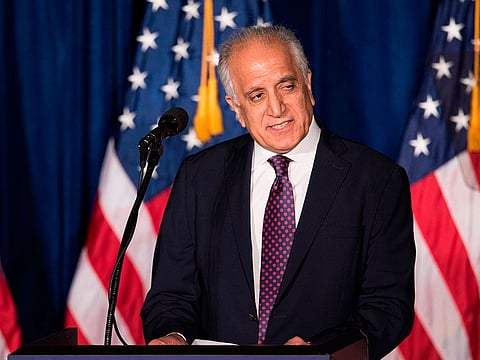US envoy to Afghanistan Zalmay Khalilzad quits
Veteran admits to shortcomings, says making may for 'new phase of our Afghanistan policy'

Washington: Zalmay Khalilzad, the veteran US envoy whose months of hotel-ballroom diplomacy helped end the US war in Afghanistan but failed at preventing a Taliban takeover, resigned on Monday.
In a letter to Secretary of State Antony Blinken, Khalilzad defended his record but acknowledged that he came up short and said he wanted to make way during the “new phase of our Afghanistan policy.”
“The political arrangement between the Afghan government and the Taliban did not go forward as envisaged,” he wrote.
“The reasons for this are too complex and I will share my thoughts in the coming day and weeks.”
Born in Afghanistan, the dapper 70-year-old academic turned US diplomat took senior positions under former president George W. Bush, becoming the US ambassador to Kabul and then Baghdad and the United Nations.
As former president Donald Trump itched to end America’s longest war in Afghanistan, he brought back Khalilzad, who led exhaustive talks with the Taliban — without including the US-backed government in Kabul.
Those talks led to a February 2020 agreement in which US troops would leave the following year.
But peace negotiations between the Taliban and the leadership in Kabul failed to gain traction, and the government that the United States built over 20 years crumbled within days as US troops left.
Khalilzad, despite his Republican affiliation, was kept in place when Democratic President Joe Biden defeated Trump and decided to go ahead with the withdrawal.
Khalilzad soon became a lightning rod for criticism, with even his superiors in the Biden administration — while voicing respect for him personally — faulting the diplomacy behind the 2020 agreement.
Blinken said that Khalilzad’s deputy, Thomas West, would take over as the special envoy.
West is a veteran aide to President Joe Biden, serving on his staff when he was vice president. West has worked for years on South Asia policy including on the US-India civilian nuclear deal.
Khalilzad also courted US adversaries China and Russia, succeeding in reaching public statements in which the countries would show a united front.
Shortly before Khalilzad’s resignation became public, the State Department said the United States would not be able to attend a new session called Tuesday by Russia that also includes China and Pakistan, historically the Taliban’s primary backer.
Rare US figure
Steeped in Afghanistan’s language and customs, Khalilzad was a rare US diplomat able to develop a friendly rapport with the Taliban foes whose regime had been ousted after the September 11, 2001 attacks.
After Trump ended US opposition to speaking to the Taliban, Khalilzad engineered the release from a Pakistani jail of the group’s co-founder Mullah Baradar, seen as a figure who could deliver on promises, and spent months with the largely rural rebels in a luxury hotel in the Qatari capital Doha.
But pictures of him smiling with the Taliban earned him heated criticism in Kabul where some in the now-fallen government as well as Western-oriented social media users berated him and accused him of selling out Afghanistan.
In an interview last month, Khalilzad said that he had reached a deal with the Taliban in which the Islamist insurgents would stay out of Kabul and negotiate a political transition.
But Khalilzad said that the deal collapsed when president Ashraf Ghani fled the country and the Taliban saw a security vacuum.
Speaking to Foreign Policy, Khalilzad said that the Taliban fulfilled key parts of the February 2020 agreement including not attacking the departing US troops.
“I respect those who say we shouldn’t have negotiated with the Talibs without the government being there. But we don’t know how much more fighting would have taken for the Talibs to agree to that,” he said.
But with no appetite in the United States for another surge of troops in its longest war, “each year we were losing ground to the Talibs,” he said.
“Time was not on our side.”
Sign up for the Daily Briefing
Get the latest news and updates straight to your inbox







